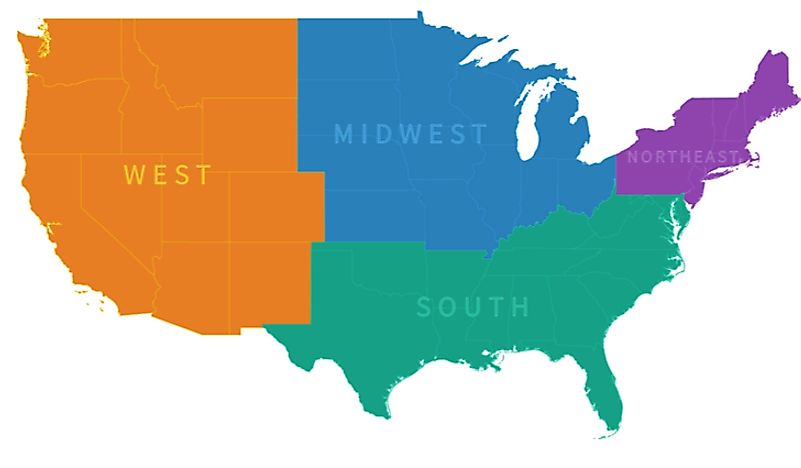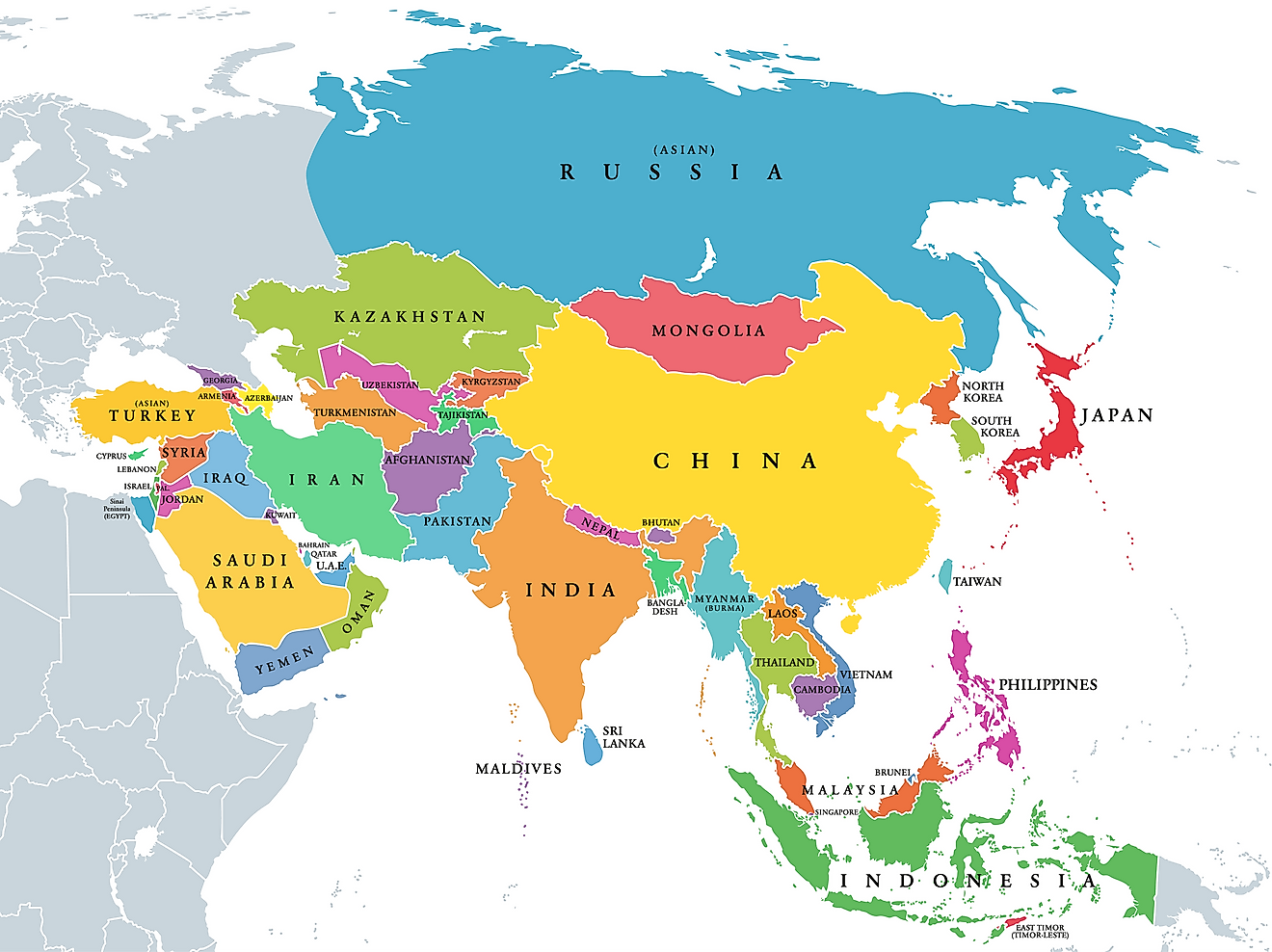The Regions of the United States

- There are four main regions in the US according to the Census Bureau including the northeast, midwest, south, and west, although some add more divisions.
- The south is a large economic driver, producing a large part of the country's GDP.
- Historically speaking, the midwest and northeast have the highest median annual household income, which are both above the national average.
The US is a huge country with a diverse population that is full of geographic marvels. From the Grand Canyon to the redwood forests, multiple mountain ranges, phenomenal deserts, and awe-inspiring beaches, it has something for just about everyone.
The United States covers around 3,531,905 square miles (9.834 million square kilometers) and is home to world-class cities and intriguing small towns. Some of its spaces are also open and lonely.
Because the country is so big, it has been divided into regions by the US government. This was done in order to more easily discuss issues that pertain to each area.
The US Census Bureau is an agency that asks Americans questions and produces data about their lives. It has divided the country into four main regions. These include the Northeast, Midwest, West, and South. Within these core areas, the Census Bureau has divided things further, with regions like the Pacific Region, Mountain, West North Central, and Mid-Atlantic regions. These subregions are areas that are certainly useful to know about. Generally speaking, however, people do not use these terms on a daily basis in casual conversation. The main four regions, Americans do, however.
It is also worth mentioning that you might find other government agencies that have divided the country up in other ways, just to keep things confusing. The US federal court system has been known to reference eleven different regions. The Federal Reserve uses twelve districts, and the Bureau of Economic Analysis references eight regions. For the sake of simplicity, we are going to focus on the four main regions mentioned above.
Northeast

The Northeastern US covers eleven states and runs up the Atlantic coast and borders on Canada to the north. It comprises the states of Vermont, Connecticut, Delaware, Pennsylvania, Maine, Massachusetts, Maryland, New Hampshire, New Jersey, New York, and Rhode Island. Whites or Caucasians from the majority in this region and about 65% of people in the area are Christians.
Almost 56 million people live in the US northeast. While this may sound like a lot, it comes as no surprise when you consider that this region is home to places like New York City, Baltimore, Boston, and Philadelphia.
What do people do for a living here? Healthcare is the top employer, followed by the retail, education, and manufacturing industries. In 2018, people in the northeast had the highest median household income in the country at $70,113, well above the national average of $63,179.
Famous northeasterners include John Travolta, Cyndi Lauper, and Denzel Washington.
Midwest

The Midwest is a region that draws some conflict. It is not that the Midwest is at war, but rather that people can’t really agree as to where its boundaries are on a map. According to the US government, the states found in this region include Minnesota, North Dakota, South Dakota, Iowa, Nebraska, Wisconsin, Missouri, Indiana, Illinois, Michigan, Ohio, and Kansas. Big cities include the likes of Detroit, Milwaukee, Kansas City, Chicago, Indianapolis, and Omaha.
A survey of 12,000 people done by Bloomberg.com found not everyone agrees with the government, however, or with each other, on these borders. (Yes some things never change).
Some can’t agree where the midwest starts and another region begins. Some things are for certain. Almost everyone surveyed by Bloomberg.com agreed the big cities mentioned above plus Minneapolis and Columbus were definitely in the midwest. But places like Pittsburgh and Buffalo caused problems. Technically, they are in the Northeast. Some say the culture in these areas is more akin to that of the midwest though, as are people’s accents. Some people in these cities found they felt more mid-western, and others more like northeasterners.
Likewise, in South Dakota, where the midwest becomes the west, some people said they felt drawn to midwestern identities, and others to the west. So, whatever is officially defined as America’s “heartland” may depend on who you talk to.
What is the midwest known for? The majority of people voted for the Republican party in the 2018 elections, and Abraham Lincoln spent his formative years living in the area.
Other famous people from the Midwest include Betty White, Marlon Brando, James Dean, Madonna, David Letterman, Michael Jackson, and Chi McBride.
West

The American West is full of folklore. From cowboys and gunfights at noon on the American frontier, to Hollywood and its limelight of fame, the west has stories to tell. Today, this region has the second-highest median household income trailing just behind the northeast at $69, 520. It is also home to over 78 million people, with major industries that include agriculture, services like financial services and hospitality, film, and manufacturing. Somewhat surprisingly, the most profitable industry in the region is that of machinery and mechanical appliances, which generated over $26 billion in 2018.
The states that comprise the American west include Hawaii, Alaska, Idaho, Montana, Colorado, Wyoming, Utah, Nevada, Arizona, California, Washington, Oregon, and New Mexico.
South
The south is a vast area in the US that covers many states. It includes those of West Virginia, Virginia, Texas, Tennessee, South Carolina, Oklahoma, North Carolina, Mississippi, Maryland, Louisiana, Kentucky, Georgia, Florida, the District of Columbia, Delaware, Arkansas, and Alabama. This region is home to the largest percentage of the population in the country, and it can trace many of its roots back to slavery. Segregation is no longer officially practiced in places like schools in the south, but the region was once famous for dividing its restaurants, educational institutions, and other public places between blacks and whites, prohibiting blacks from attending or being served.

This type of unequal treatment also happened in other regions of the country but was most pronounced in the south. Segregation by race was practiced well into the 1960s, until the Civil Rights Act was signed in 1964, as a culmination of the efforts of Dr. Martin Luther King Jr. and the civil rights movement. This act outlawed discrimination, yet the practice still continues in various ways.
Today, the south has become a major economic driver of the country, producing about 34% of the GDP.
Each region of the US has a distinct flavor, culture, and history. By praising and celebrating the country’s differences, many will see that its people also have much in common, with the same everyday needs, wants, and hopes. It is the diversity of the US that makes it rich in spirit, as well as economic gain.











